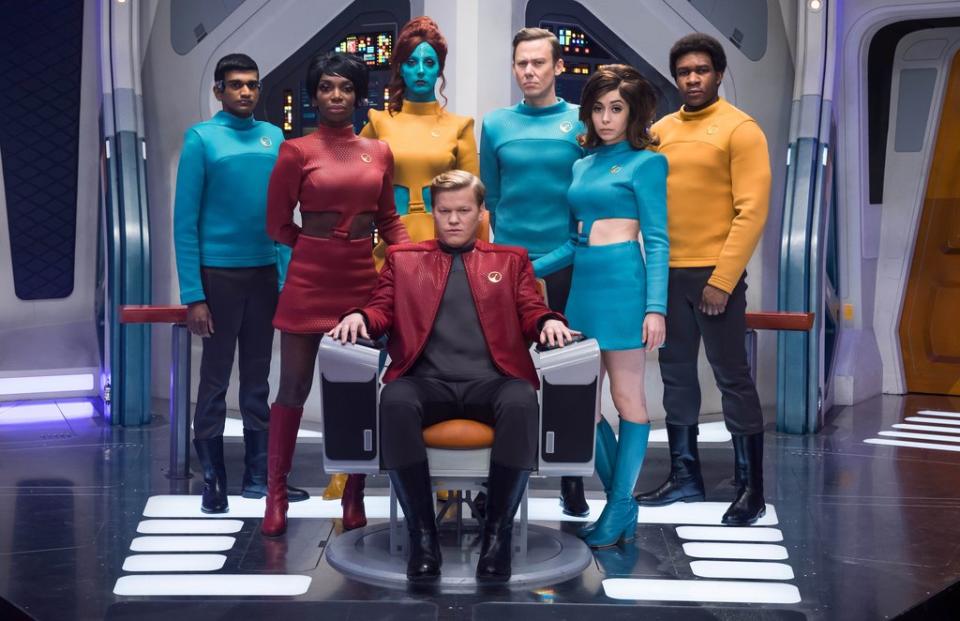Black Mirror’s USS Callister is a perfect metaphor for nerd culture in 2017

This article contains significant spoilers for the first episode of Black Mirror Series 4, USS Callister.
USS Callister opens with a loving homage to Star Trek.
It’s a finely detailed, evocative recreation of the style of the old sci-fi serial; invoking the bright colours, distinctive incidental music and boxlike aspect ratio of the original series, director Toby Haynes brings the aesthetic to life perfectly. Indeed, it’s wouldn’t be difficult to convince someone that this really was taken from the 60s, a relic of some Star Trek spinoff that never quite got off the ground.
But this in itself sets up the central tension of the episode, establishing the backdrop for USS Callister to propose the perfect metaphor for nerd culture in 2017.
The Star Trek world is a virtual reality; a simulation created by Robert Daley (Jesse Plemons), an escapist fantasy where he can be the beloved Captain rather than an unfairly dismissed nerd. In effect, it’s a crutch – a way to ignore the real world, to focus on the USS Callister, a place where he can be in control. At first this escapism is depicted as a more-or-less positive thing; indeed, the episode puts forward a clever misdirect, starting the story with a sympathetic focus on Daley such that it appears that he’s the protagonist of the story. At the outset, it looks as though USS Callister is going to be about Daley as a nice guy who’s mistreated by his colleagues, who can never quite get the girl – or, at least, not outside of the simulation anyway.
Quickly, though, the focus shifts, making it obvious that this initial impression isn’t wholly accurate.
Daley isn’t the hero of the piece; rather, he’s the villain. He really is just a creep – rude, antisocial, uncaring. Maybe he does have a valid grievance, or once did, but given what he’s done since it doesn’t matter. Each member of his crew is, in effect, his prisoner; there’s a certain viciousness to Daley’s control of them, a viciousness that’s easily recognised in nerd culture in 2017, and one that makes USS Callister feel deeply relevant today.

The escapist fantasy is based on a slavish adherence to the idiosyncrasies of the original, yes – but, crucially, an unthinking and uncritical adherence, without acknowledgement of the flaws inherent to the premise. It’s the same fundamental mentality that prompts outrage and fury at the inclusion of women or POC in Star Trek, Star Wars, or Doctor Who; the impulse to curate rather than create, the desire to maintain a static and staid world. Shaped around the ego of a single white man, this is of course a world that equates foreign with alien, denies women their sexuality, dehumanises people of colour, and never lives up the ethos and code of conduct it claims to assert.
USS Callister continues to advance its metaphor, though, and in turn posits a solution of its own. And, in turn, of course said solution comes from a woman.
Daley’s latest prisoner, Nanette Cole (Cristin Milioti), punctures the rigorous strictures and limitations he’s placed on the world – she’s able to escape, undercutting his power and establishing a new narrative. It’s worth remarking on the fact that Nanette’s solutions come from her technical ability; when told it’s impossible to hack the system, she replies that she hasn’t tried yet. At least in part, the resolution depends on skills that are regularly accepted of male characters in a genre setting, but would see a female character dismissed as a Mary Sue; similarly, it’s also key that this is again drawn from Nanette’s skill and prowess in a typically male-dominated field, with progress achieved because of the new ideas she offers.
And so the visual signifiers are updated; this is no longer the Star Trek of the 1960s but that of the 2010s, lens flares and all. A woman is in the captain’s seat. Things aren’t perfect, but they’re better, at least. And now they really can explore the final frontier, and all that it offers.
You could argue, perhaps, that the relatively happy ending is somewhat off-brand for Black Mirror, But, by the same token, that’s almost missing the point of USS Callister. It’s not about the happy ending for the crew, but what was needed to achieve it. It’s the final pan across Daley’s now lifeless body, far divorced from the great adventure he claimed to love but never really understood, that emphasises the final message of USS Callister:
People like Daley need to be left in the past; they’re stuck there already, and it’s time to take back control of the narrative.
Related:
Why Star Trek: Discovery must deal with the legacy of Janice Rand
Ranking the episodes of Philip K. Dick’s Electric Dreams
Like this article? Hate this article? Why not follow me on twitter for more, or send me a message on facebook to tell me what you thought? You can also find more of my articles for Yahoo here, or check out my blog here.

 Yahoo Movies
Yahoo Movies 

